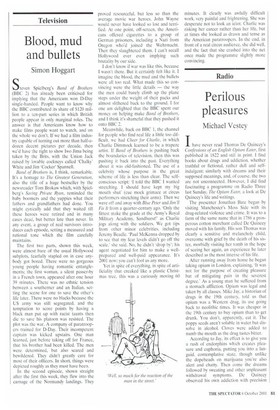Television
Blood, mud and bullets
Simon Hoggart Steven Spielherg's Band of Brothers (BBC 2) has already been criticised for implying that the Americans won D-Day single-handed. People want to know why the BBC contributed its share of S120 million to a ten-part series in which British people appear in only marginal roles. The answer is that Americans know how to make films people want to watch, and on the whole we don't. If we had a film industry capable of turning out more than half-adozen decent pictures per decade, then we'd have the right to show Iwo Jima being taken by the Brits, with the Union Jack raised by lovable cockneys called 'Chalky' White and Jim 'Cocker' Spannell.
Band of Brothers is, I think, remarkable. It's a homage to The Greatest Generation, also the title of a huge bestseller by the newsreader Tom Brokaw which, with Spielberg's Saving Private Ryan, reminded the baby boomers and the yuppies what their fathers and grandfathers had done. You might cynically add that they waited till these heroes were retired and in many cases dead, but better late than never. In any event, a group of real survivors introduces each episode, setting a measured and rational tone which the film carefully maintains.
The first two parts, shown this week, were almost bare of the usual Hollywood subplots, fearfully stapled on in case anybody got bored. There were no gorgeous young people having romantic entanglements; the first woman, a silent passer-by in a French town, appeared after one hour 39 minutes. There was no ethnic tension between a southerner and an Italian, setting the scene for one to save the other's life later. There were no blacks because the US army was still segregated, and the temptation to score points by having a black man put up with racist taunts then die to save his platoon was resisted, The plot was the war. A company of paratroopers trained for D-Day. Their incompetent captain was kicked upstairs. One man learned, just before taking off for France, that his brother had been killed. The men were determined, but also scared and bewildered. They didn't greatly care for most of their officers. In short, things were depicted roughly as they must have been.
In the second episode, shown straight after the first this week, they flew into the carnage of the Normandy landings. They proved resourceful, but less so than the average movie war heroes. John Wayne would never have looked so lost and terrified. At one point, off-screen, the Americans offered cigarettes to a group of German prisoners, including a Nazi from Oregon who'd joined the Wehrmacht. Then they slaughtered them. I can't recall Hollywood ever even implying such brutality by our side.
I don't know if war was like this, because I wasn't there. But it certainly felt like it. I imagine the blood, the mud and the bullets were all too real. What made this so convincing were the little details — the way the men could barely climb up the plane steps under the weight of their packs and almost slithered back to the ground. I for one am delighted that the BBC spent our money on helping make Band of Brothers, and I think it's shameful that they pushed it onto BBC 2.
Meanwhile, back on BBC 1, the channel for people who find real life a little too difficult. we had Cheer for Charlie, in which Charlie Dimmock learned to be a trapeze artist. If Band of Brothers is pushing back the boundaries of television, then this was pushing it hack into the past. Everything about it was old-fashioned. The use of a celebrity whose purpose in the great scheme of life is less than clear. The selfconscious script: 'I told the BBC I wanted stretching. I should have kept my big mouth shut' (cue mock grimace at circus performers stretching their arms). Then we were off and away with Blue Peter and Jim 'ii Fix It from a quarter-century ago. 'Only the fittest make the grade at the Army's Royal Military Academy, Sandhurst!' as Charlie jogs along with the soldiers. We got tips from other minor celebrities, including Jeremy Beadle. 'Paul McKenna dropped by to see that my fear levels didn't go off the scale,' she said. No, he didn't 'drop by'; his agent negotiated for him to make a wellprepared and well-paid appearance. It's 2001 now; you can't fool us any more.
Yet in spite of everything, in spite of artificiality that creaked like a plastic Christmas tree. this was a curiously moving 60 minutes. It clearly was awfully difficult work, very painful and frightening. She was desperate not to look an idiot. Charlie was risking her career rather than her life, but at times she looked as drawn and tense as the American paratroopers. In the end, in front of a real circus audience, she did well, and the fact that she crashed into the net once made the programme slightly more convincing.


































































































 Previous page
Previous page